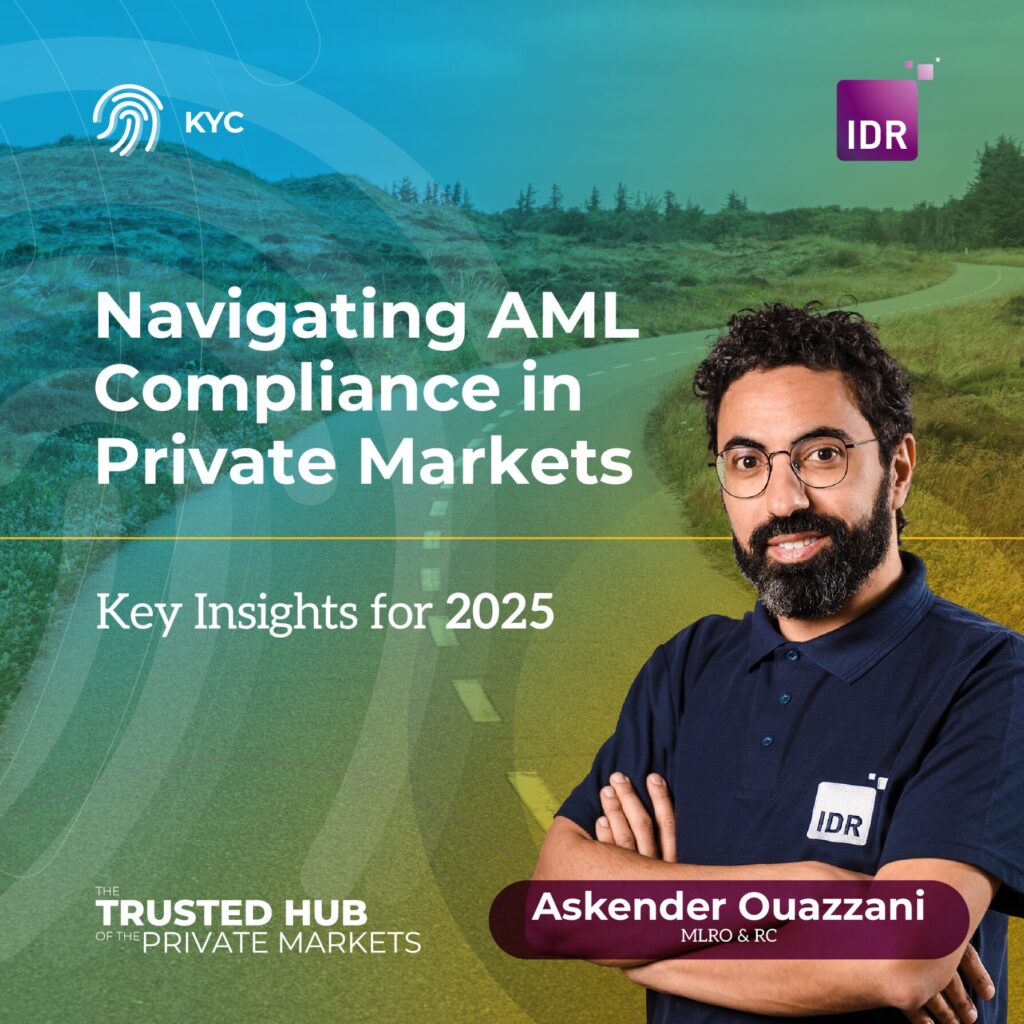Private markets fund managers continue to operate in a rapidly evolving and increasingly complex regulatory environment. IDR’s Luxembourg based MLRO, Askender Ouazzani looks ahead to 2025 and beyond at the key trends, challenges, and opportunities in AML and KYC practices that are shaping the landscape for fund managers.
Key AML trends
- Corruption Prevention
Corruption remains a focal point for regulatory bodies worldwide. The EU continues to develop anti-corruption legislation, but it lags behind the United States in implementing robust measures. Enhanced focus on corruption prevention is expected to remain a priority.
From a private markets perspective, corruption risks are increasingly being integrated into due diligence processes, especially in private equity investments. Regulators and firms alike are focusing on ensuring robust compliance measures when assessing target companies. This includes examining governance frameworks, conducting detailed corruption risk assessments, and identifying political or geographic exposure.
- Enhanced Data Sharing and Collaboration
Regulatory and industry momentum is driving greater information sharing between financial institutions, law enforcement, regulators, and other stakeholders. Initiatives like public-private partnerships and the application of data analytics are enabling more effective collaboration to combat financial crime.
Key developments during 2024 in respect to the sharing of data to tackle financial crime include the launch of the COSMIC platform in Singapore in April 2024 and the introduction of Beneficial Ownership Information Reporting in the U.S. under the Corporate Transparency Act in January 2024. During 2024 FinCEN began the process of providing phased access to this information to government agencies and financial institutions that meet the requirements for the Beneficial Ownership Information Access and Safeguards final rule.
- Integration of ESG in Compliance
The integration of Environmental, Social, and Governance (ESG) considerations into AML/CFT compliance is gaining traction. ESG-driven KYC processes are increasingly evaluating clients’ impacts on issues such as anti-corruption, environmental crime, and human trafficking, requiring broader due diligence approaches.
- AI and ML for Real-Time Monitoring
Regulators are encouraging the use of artificial intelligence and machine learning for real-time transaction monitoring and predictive analytics. While these technologies enhance risk detection and operational efficiency, they also introduce challenges, such as managing algorithmic bias and ensuring data integrity. The application of these emerging technologies for AML compliance purposes must therefore be balanced with human expertise to review and sense check findings.
Challenges
- Cost of Compliance
Rising regulatory expectations and continued investment in advancing technologies are increasing compliance costs. Fund managers must therefore find cost-effective ways to enhance compliance programs without compromising effectiveness and client / investor experience. Additionally, attracting and retaining skilled professionals with expertise in using technology, data analysis, and regulatory compliance adds to the rising costs of compliance.
Thoughtful outsourcing to expert providers, tech platforms that can deliver firm-wide benefits and drive economies of scale combined with an effective risk-based approach can all help to mitigate costs and focus resource to best effect.
- Demonstrating Effectiveness
Regulators are emphasising the need for tangible outcomes in compliance programs. Moving beyond checklist-driven approaches, organisations must increasingly provide evidence of their effectiveness in detecting and preventing financial crime.
- Complex Data Management
The growing volume and variety of data from diverse sources demand robust processes to ensure data quality, accuracy, and consistency. Effective data management is essential for informed risk assessment and compliance as is the professional expertise to analyse and apply the insights it provides.
Opportunities
- Streamlined Onboarding and Enhanced Efficiency
The adoption of e-KYC solutions and RegTech tools is revolutionising compliance and investor onboarding processes. Automated workflows and AI-driven systems can help to reduce manual workloads and expedite risk detection enabling professionals to focus on higher-value tasks, such as complex investigations and strategic risk analysis whilst also improving investor experience. These types of solutions will also be essential with the ongoing retailisation of the private markets as fund managers raise bigger funds from a much wider pool of investors.
- Expanding Data Analytics Skills
Developing expertise in data analytics allows compliance professionals to detect patterns and trends indicative of financial crime. Mastery of these skills can significantly enhance their effectiveness and value within organisations.
Looking Ahead
Over 2025 and beyond the regulatory landscape will require KYC professionals to adapt to and adopt new technologies, embrace global compliance standards and strike a balance between regulatory and commercial priorities. Although challenges such as rising costs and heightened regulatory scrutiny persist they also present opportunities for innovation, streamlined processes, and enhanced risk management. Proactive engagement with emerging trends whilst harnessing new technologies in conjunction with expert human oversight will be key to staying ahead in this dynamic environment.
To discover how IDR can help private markets fund managers to stay ahead of KYC and regulatory compliance obligations visit our solutions page or reach out to Askender Ouazzani.


